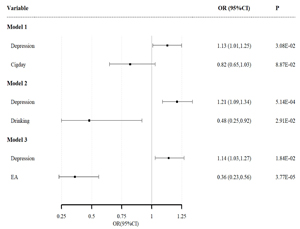Bridging Three Years of Insights: Examining the Association Between Depression and Gallstone Disease
DOI:
https://doi.org/10.14740/jocmr6050Keywords:
Gallstone, Depression, National Health and Nutrition Examination Survey, Mendelian randomization analysis, CausalityAbstract
Background: Despite sharing common pathophysiological risk factors, the relationship between gallstones and depression requires further evidence for a clearer understanding. This study combines the National Health and Nutrition Examination Survey 2017 - 2020 observational data and Mendelian randomization (MR) analysis to shed light on the potential correlation between these conditions.
Methods: By analyzing the National Health and Nutrition Examination Survey 2017 - 2020 data through weighted multivariable-adjusted logistic regression, we examined the association between depression and gallstone risk. MR was subsequently applied, utilizing genetic instruments from a large genome-wide association study on depression (excluding 23andMe, 500,199 participants) and gallstone data (28,627 cases, 348,373 controls), employing the main inverse variance-weighted method alongside other MR methods to explore the causal relationship. Sensitivity analyses validated the study’s conclusions.
Results: Among the 5,303 National Health and Nutrition Examination Survey participants, a significant association was found between depressive symptoms and increased gallstone risk (initial odds ratio (OR) = 2.001; 95% confidence interval (CI) = 1.523 - 2.598; P < 0.001), with the association persisting after comprehensive adjustments (final OR = 1.687; 95% CI = 1.261 - 2.234; P < 0.001). MR findings also indicated a causal link between genetically predicted depression and higher gallstone risk (OR = 1.164; 95% CI = 1.053 - 1.286; P = 0.003).
Conclusions: Depression is significantly associated with a higher risk of gallstones, supported by genetic evidence suggesting a causal link. These findings highlight the importance of considering depression in gallstone risk assessments and management strategies.

Published
Issue
Section
License
Copyright (c) 2024 The authors

This work is licensed under a Creative Commons Attribution-NonCommercial 4.0 International License.








